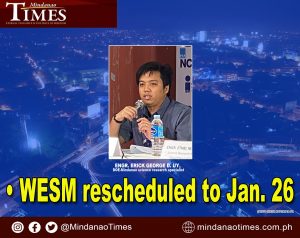THE Department of Energy (DOE) postponed for another month to January 26, 2023 the start of operations of the wholesale spot electricity market (WESM) in Mindanao, an official said Monday.
Engr. Erick George D. Uy, DOE-Mindanao science research specialist, said in a text Monday that the department, through Secretary Raphael Lotilla, issued Department Circular 0039 to announce the start of WESM operations next month after it was initially announced that the start would be after Christmas day.
As of earlier December, Uy said, 18 electric cooperatives in Mindanao that are connected to the grid have registered, while others have applied. Among those whose registration was approved was the Davao Oriental Electric Cooperative which serves the entire Davao Oriental.
The two other electric cooperatives in the Davao Region, the Davao del Sur Electric Cooperative (Dasureco) and the Davao del Norte Electric Cooperative (Daneco), have applied with the market operator, the Independent Electricity Market Operator-Philippines, but their applications have yet to be approved.
The two cooperatives service their namesake provinces and the provinces carved out of them, Davao Occidental for Dasureco and Davao de Oro for Daneco.
 For Daneco, however, part of Davao del Norte is being serviced by the Davao Light and Power Co. (Davao Light), the power provider of Davao City. A congressional proposal was passed to turn over the rest of the province to Davao light, but President Ferdinand Marcos Jr. vetoed it.
For Daneco, however, part of Davao del Norte is being serviced by the Davao Light and Power Co. (Davao Light), the power provider of Davao City. A congressional proposal was passed to turn over the rest of the province to Davao light, but President Ferdinand Marcos Jr. vetoed it.
Mindanao Development Authority Assistant Secretary Romeo M. Montenegro said in a text message that most of the 34 electric cooperatives in Mindanao that are connected to the grid have applied with the electricity market. There are five electric cooperatives that are isolated from the grid.
The cooperatives, Montenegro added, “have demonstrated readiness (in joining the market)” as a result of several capacity-building activities designed to help them plan their projected need at a given time when the at a given time when the are to nominate how much of their demand they will need from the market or if they sell their surplus to it.
However, Montenegro about two years ago said some cooperatives may not be able to participate in the market as electricity buyer because the have contracted more than their need, although they can still manipulate their demand to source cheaper power from the market or sell their surplus.
The demand from cooperatives is important especially for the operations of incoming renewable energy plants considering that under the law, he said, these plants get to be dispatched to the grid first.
Most of the power distributors in Mindanao are electric cooperatives as only four are privately-owned: Davao Light, Cotabato Light and Power Co. in Cotabato City, Cagayan de Oro Electric Power and Light Co. in Cagayan de Oro City, and Iligan Light and Power Inc. in Iligan City.
However, unlike the Luzon and the Visayas, Mindanao is isolated from the national grid as the interconnection, a project being implemented by transmission operator National Grid Corp. of the Philippines, has yet to be completed.
The isolation of Mindanao from the rest of the country took a toll in 2010 when the island experienced lengthy power outages that are as long as 12 hours in some parts of the island.
There have been proposals to block the interconnection project because this will allow the rest of the country to buy power from its crown jewels, the hydroelectric power complexes in Pulangi and Agus that are under the operational authority of the Power Sector Assets and Liabilities Management Corp. as these are sources of cheap power that sells at a minimum of P1 per kilowatt-hour.
Instead of interconnection, there have been congressional proposals to form these two complexes into Mindanao Power Corp. either as a private entity or government-controlled corporation to maintain the low price for its power. However, under the Electric Power Industry Reform Act, since these complexes are government-operated, they must be privatized just like most of the government assets.
The same law is the framework for the operations of the wholesale electricity spot market.
